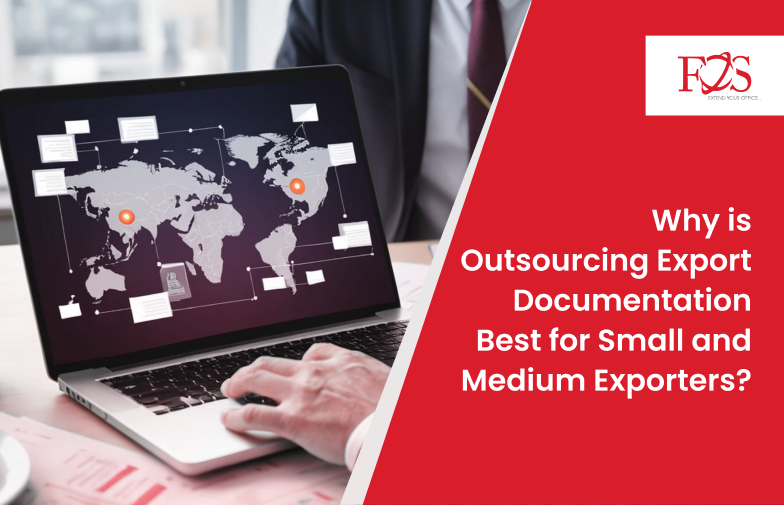If you’re a small or mid-sized exporter in the United States, you’re no stranger to the complexities of export documentation. Each shipment demands layers of paperwork, compliance checks, and coordination across various departments. You’re constantly juggling between growing your business and staying compliant with trade regulations. And that’s where outsourcing comes into play.
Outsourcing your export documentation to a Logistics BPO service provider isn’t just about reducing your workload. It’s a smart strategic move that can cut costs, reduce errors, and improve your operational efficiency, especially if you’re managing tight margins and limited in-house resources.
Let’s explore why handing off this responsibility to an experienced logistics back-office partner might be one of the best decisions for your business.
1. The Documentation Burden is Real
From commercial invoices and packing lists to certificates of origin and bills of lading, the average export shipment can involve up to 10 or more key documents. Each document must be prepared according to specific formats, timelines, and compliance standards.
For small teams, this can become overwhelming fast. Even a single mistake can result in delayed shipments or hefty fines. By outsourcing this task to a Logistics BPO company, you offload this burden while ensuring everything is prepared accurately and on time.
2. Reduce Operational Costs Significantly
Hiring, training, and maintaining a documentation team is expensive. According to recent market insights, the average salary of a full-time export documentation specialist in the U.S. is around $55,000 per year. Add overhead costs like software, HR, and employee benefits, and the figure goes much higher.
By contrast, outsourcing to a specialized BPO in logistics helps you avoid these fixed costs. You only pay for the services you use, which can be scaled as your volume grows. This cost-efficiency is a game-changer for smaller exporters trying to stay lean and profitable.
3. Access to Industry Experts Without Hiring Them
You’re not just hiring assistance when you outsource your export documents; you’re gaining access to a group of experts who are logistics experts. These teams often come with years of experience, deep industry knowledge, and a pulse on international trade changes.
They understand the smallest nuances of HS codes, Incoterms, country-specific compliance requirements, and port procedures. For small and medium exporters, this level of expertise is often out of reach when hiring in-house.
4. Fewer Errors, Delays, and Penalties
Manual errors in export paperwork are more common than you think. A wrong HS code, missing signature, or even a date format error can cause customs delays or legal issues.
With a Logistics BPO service, all documentation is double-checked through internal review processes, minimizing costly mistakes. According to a study by Logistics Management, companies outsourcing export documentation saw a 25% drop in shipment delays due to paperwork errors.
5. Faster Turnaround Times
Outsourcing partners work in streamlined environments with dedicated teams and optimized processes. That means faster document preparation, even for last-minute shipments.
Many Logistics BPOs operate in different time zones. If your partner is working while your office is closed, your documentation could be ready before you even log in the next day. It’s like having a 24/7 back-office team that never sleeps.
6. More Time to Focus on Core Business Tasks
You didn’t start your business to spend hours editing packing lists or verifying commercial invoices. By outsourcing the documentation function, you free up valuable time for yourself and your team to focus on sales, customer service, and strategic planning.
This shift in focus can directly impact growth. Small businesses that delegate time-consuming administrative tasks grow faster and become more agile in handling market demands.
7. Improved Compliance and Risk Management
Compliance with U.S. export regulations (such as EAR, ITAR, and OFAC guidelines) is critical. Non-compliance doesn’t just risk delays; it could result in severe penalties or license revocation.
An experienced Logistics BPO service ensures your documentation is always in line with the latest legal standards. They often maintain up-to-date checklists, audit trails, and historical records, which are valuable during audits or inspections.
8. Scalability Without Hassle
As your export volume grows, so does your documentation workload. Scaling up internally means hiring new staff, training them, and investing in more infrastructure. It’s time-consuming and expensive.
You may scale up (or down) as needed with outsourcing without having to make any changes to your internal system. Whether you have 10 shipments this month or 100 the next, your BPO partner can handle it with ease.
9. Better Use of Technology Without Owning It
Modern logistics BPOs invest in automation tools, document management systems, and shipping software that might be too costly for a small exporter to afford. When you outsource, you get access to these tools without investing in them yourself.
This tech-enabled support results in accurate, faster, and secure documentation, while keeping your costs low.
10. Confidentiality and Secure Handling of Trade Data
A good Logistics BPO service understands the importance of data security. Your trade secrets, pricing, and partner information are handled with strict confidentiality protocols, NDAs, and secure storage systems.
This is particularly important in today’s global landscape where data breaches can lead to financial loss or legal complications.

Conclusion
For small and medium exporters in the U.S., managing documentation in-house is not only costly but risky. By outsourcing this function to a Logistics BPO company, you can cut costs, minimize errors, and focus more on business development.
At the end of the day, your success hinges on how efficiently you manage every shipment. A strong back-office partner ensures that your documents are always ready, accurate, and compliant.
Explore our Export Documentation Support Services to see how we can help streamline your export process and make global trade a breeze for your business.
FAQs
1. Is it safe to outsource export documentation to a third party?
Yes, as long as you choose a reliable Logistics BPO partner with a strong record of confidentiality, compliance, and secure data handling.
2. Will outsourcing affect my relationship with freight forwarders or customs brokers?
Not at all. A BPO acts purely as a support partner, working behind the scenes to prepare documentation. You continue your direct communication with brokers and carriers.
3. How quickly can a BPO handle urgent documentation needs?
Most experienced BPO providers can turn around urgent export documentation within hours, depending on the shipment details and document type.
